|
|
|
Sort Order |
|
|
|
Items / Page
|
|
|
|
|
|
|
| Srl | Item |
| 1 |
ID:
100989
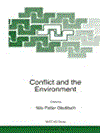

|
|
|
|
|
| Publication |
Dordrecht, Kluwer academic publishers, 1997.
|
| Description |
vii, 598p.
|
| Contents |
B
|
| Standard Number |
0792347684
|
|
|
|
|
|
|
|
|
|
|
|
Copies: C:1/I:0,R:0,Q:0
Circulation
| Accession# | Call# | Current Location | Status | Policy | Location |
| 055568 | 363.7/GLE 055568 | Main | On Shelf | General | |
|
|
|
|
| 2 |
ID:
073553


|
|
|
|
|
| Publication |
2006.
|
| Summary/Abstract |
A recent article using the new Correlates of War (COW) data on the distribution of interstate, intrastate, and extrastate wars from 1816 to 1997 claims there was a relatively constant risk of death in battle during that time. We show that the authors' information is skewed by irregularities in the COW deaths data, and contest their pessimistic interpretation. Using revised information on battle deaths from 1900 to 2002 we demonstrate that the risk of death in battle by no means followed a flat line, but rather declined significantly after World War II and again after the end of the Cold War. Future users should note that the deaths data collected for the three conflict types by COW are not comparable, and using them as such tends to underestimate the share of fatalities due to major interstate conflicts.
|
|
|
|
|
|
|
|
|
|
|
|
|
|
|
|
| 3 |
ID:
065629


|
|
|
| 4 |
ID:
095627
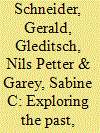

|
|
|
| 5 |
ID:
126712
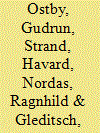

|
|
|
|
|
| Publication |
2013.
|
| Summary/Abstract |
Many studies report lower academic productivity among women. But are women less likely to get their research published in the first place? The evidence for potential gender bias in publication and impact is mixed. This article examines the gender dimension of scientific publication in international relations (IR) based on submission data for Journal of Peace Research for the period 1983-2008. It examines the gender gap in submissions and explores whether the perceived merit of a research paper is affected by the gender of the authors and reviewers. It also investigates whether the gender of the first author influences citation counts. The data show a clear but declining gender gap. They do not indicate any significant gender bias in publication success or citations.
|
|
|
|
|
|
|
|
|
|
|
|
|
|
|
|
| 6 |
ID:
036874


|
|
|
|
|
| Publication |
Oslo, International peace research Institute, 1982.
|
| Description |
43p.
|
|
|
|
|
|
|
|
|
|
|
|
Copies: C:1/I:0,R:0,Q:0
Circulation
| Accession# | Call# | Current Location | Status | Policy | Location |
| 020980 | 338.9481/CAP 020980 | Main | On Shelf | General | |
|
|
|
|
| 7 |
ID:
085304


|
|
|
|
|
| Publication |
2008.
|
| Summary/Abstract |
Fifteen years ago, Charles Kegley spoke of a neoidealist moment in international relations. This article examines how the number of armed conflicts has declined in the decade and a half since Kegley's presidential address and shows that the severity of war has been declining over a period of over six decades. The number of countries participating in war has increased, but this is in large measure due to coalition-building in several recent wars. Overall, there is a clear decline of war. It seems plausible to attribute this to an increase in the three factors identified by liberal peace theorists: democracy, trade, and international organization. Four alternative interpretations are examined: the temporary peace, the hegemonic peace, the unsustainable peace, and the capitalist peace. The article concludes that the latter, while running close to the liberal peace interpretation, also presents the greatest challenge to it. Indeed, we seem to be living in a commercial liberal period rather than a world of neoidealism.
|
|
|
|
|
|
|
|
|
|
|
|
|
|
|
|
| 8 |
ID:
025869
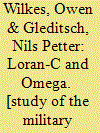

|
|
|
|
|
| Publication |
Oslo, Norwegian University Press, 1987.
|
| Description |
397p
|
| Standard Number |
82-00-07703-9
|
|
|
|
|
|
|
|
|
|
|
|
Copies: C:1/I:0,R:0,Q:0
Circulation
| Accession# | Call# | Current Location | Status | Policy | Location |
| 029159 | 623.8932/WIL 029159 | Main | On Shelf | General | |
|
|
|
|
| 9 |
ID:
115302


|
|
|
|
|
| Publication |
2012.
|
| Summary/Abstract |
The electronic revolution in academic publishing brings promises as well as pitfalls. The main promises are greater efficiency, vastly greater access to the journal literature, a more equitable global sharing of intellectual resources, and hopefully improved quality. Open access-free entry to the electronic version of the journal literature-is in many ways a logical continuation of this development and will break the trend toward accelerating journal costs. But if the subscription revenue simply disappears, neither publishers nor editors will have the necessary funding to keep up peer review and other editorial routines. One alternative is to levy page charges for publication. Intermediate models are also possible, where the journal may keep its copyright to the final edited product while authors are allowed to post the final submitted version on their Web site. At the moment, open access is uncommon in international relations, but the publishers and owners of journals, including academic societies such as ISA, would be wise to think through these issues before they become acute. This symposium is a contribution to that process.
|
|
|
|
|
|
|
|
|
|
|
|
|
|
|
|
| 10 |
ID:
128863
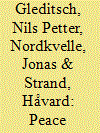

|
|
|
|
|
| Publication |
2014.
|
| Summary/Abstract |
The concept of peace has been under discussion in peace research from its start over 50 years ago. This article reviews the debate on broader and narrower conceptions of peace and investigates empirical patterns in the first 49 volumes of Journal of Peace Research, with some comparisons with Journal of Conflict Resolution. Negative peace, in the sense of reducing war, was the main focus in peace research from the inception. But positive peace, in the sense of cooperation or integration, has also always been on the peace research agenda, as reflected in the contents of both journals. Over time, a larger share of the articles in JPR has 'violence' or related terms in the title, while the incidence of the word 'peace' is fairly stable. Furthermore, articles on peace generally have fewer citations than those with violence-related terms. A broad concept of peace, as encouraged by the definition of positive peace as the reversal of structural violence, was popular in peace research for a decade or so, but has largely evaporated. To some extent, peace research has returned to its original agenda, although the main attention has shifted from interstate war to civil war and to some extent to one-sided and non-state violence. Articles dealing with patterns of cooperation, the traditional meaning of positive peace, now tend to address the liberal agenda and ask how they can foster a reduced probability of violence. Despite the 'gender gap', the increasing share of female authors in the journal appears to have had little influence on these developments although it may well have had other effects.
|
|
|
|
|
|
|
|
|
|
|
|
|
|
|
|
| 11 |
ID:
149103


|
|
|
|
|
| Summary/Abstract |
Replication is widely seen as an important way to promote transparency and quality control of published work in the social sciences. In international relations, the replication movement moved forward with a panel at the International Studies Association in 2002, subsequently published in this journal. The publication included a joint statement by four editors of leading quantitative journals in international relations, pledging their journals to a set of minimum replication standards and urging other editors to follow suit. Over the years, these and other journals have posted hundreds of data sets. Nevertheless, progress has been slow, and many journals still have no policy on replication or fail to follow up in practice. In this forum, we discuss how improvements can be made to current policies and practices and how replication can be used systematically in teaching international relations and extended to qualitative work.
|
|
|
|
|
|
|
|
|
|
|
|
|
|
|
|
| 12 |
ID:
178654
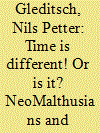

|
|
|
|
|
| Summary/Abstract |
Warning about dire effects of climate change on armed conflict is a recent variation of a scenario that has been promoted by environmental pessimists for over two centuries. The essence is that human activities lead to resource scarcities that in turn will generate famine, pestilence, and war. This essay reviews three stages of the argument: first, the original Malthusian thesis that focused on food production. Second, the broader neoMalthusian concern from the 1970s about limits to growth and developing scarcities in a range of necessities. And recently, the specter of climate change. In each phase, the Malthusians have met firm opposition from environmental optimists, who argue that emerging scarcities can be countered by human ingenuity, technological progress, and national and international economic and political institutions and that environmental change is not in itself a major driver of human violence. In the third phase, the Malthusian case appears to be stronger because human activities have reached a level where they have a truly global impact. Environmental optimists still insist that these problems can be overcome by human ingenuity and that the long-term trend towards less violence in human affairs is unlikely to be reversed by climate change. The stakes seem higher, but the structure of the debate remains largely the same.
|
|
|
|
|
|
|
|
|
|
|
|
|
|
|
|
| 13 |
ID:
125145
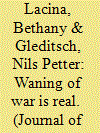

|
|
|
|
|
| Publication |
2013.
|
| Summary/Abstract |
A number of recent studies argue that there is decline in armed conflict within and between nations. Gohdes and Price run against the grain in arguing that there is no evidence for a decrease in battle deaths in armed conflicts after World War II and that the trend reported in our earlier articles is spurious. However, they do not plausibly justify this thesis. We reexamine the argument for a decline, exploring nonlinearities in the data and potential biases due to measurement error. We find that very strong assumptions must hold in order for measurement errors to explain the trend in battle deaths.
|
|
|
|
|
|
|
|
|
|
|
|
|
|
|
|
| 14 |
ID:
110801


|
|
|
|
|
| Publication |
2012.
|
| Summary/Abstract |
Until recently, most writings on the relationship between climate change and security were highly speculative. The IPCC assessment reports to date offer little if any guidance on this issue and occasionally pay excessive attention to questionable sources. The articles published in this special issue form the largest collection of peer-reviewed writings on the topic to date. The number of such studies remains small compared to those that make up the natural science base of the climate issue, and there is some confusion whether it is the effect of 'climate' or 'weather' that is being tested. The results of the studies vary, and firm conclusions cannot always be drawn. Nevertheless, research in this area has made considerable progress. More attention is being paid to the specific causal mechanisms linking climate change to conflict, such as changes in rainfall and temperature, natural disasters, and economic growth. Systematic climate data are used in most of the articles and climate projections in some. Several studies are going beyond state-based conflict to look at possible implications for other kinds of violence, such as intercommunal conflict. Overall, the research reported here offers only limited support for viewing climate change as an important influence on armed conflict. However, framing the climate issue as a security problem could possibly influence the perceptions of the actors and contribute to a self-fulfilling prophecy.
|
|
|
|
|
|
|
|
|
|
|
|
|
|
|
|
|
|
|
|
|